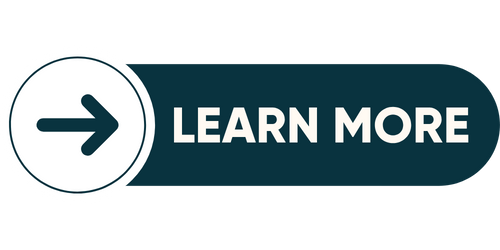Cannabis for Harm Reduction: A Path Beyond Opioids
Aug 26, 2025
By Debi Wimberley, Cannabis Specialist and Founder of the Effective Cannabis Newsletter
A personal story of how Cannabis saved my life when the healthcare system failed me.
When medical professionals forced me off opioids after 21 years of responsible use, I had to discover on my own what some chronic pain patients were quietly learning: Cannabis isn't just an alternative medicine, it's a life-saving harm reduction tool that can replace an entire pain management system when properly understood and applied. My story illustrates how Cannabis literally saved my life when the healthcare system abandoned me, transforming me from a patient contemplating suicide to someone living pain-free and advocating for others.
This is my real story of medical abandonment, Cannabis harm reduction, and complete recovery. It's intense and disturbing, but with an ending that demonstrates the transformational power of Cannabis as medicine.
The Crisis: Medical Abandonment at Its Worst
Living with Complex Regional Pain Syndrome (CRPS) (1) for 21 years, I had survived the "suicide disease" with responsible opioid treatment. I was prescribed Fentanyl and OxyContin for over two decades, living daily in pain at levels of 7-10. It wasn't a good or happy life, but it was a life I had learned to manage, constantly reminding myself there was a reason for me to be here.
The scope of this crisis is staggering: over 50 million Americans live with chronic pain (CDC, 2023) (2), yet many are being abandoned by the very healthcare system meant to help them.
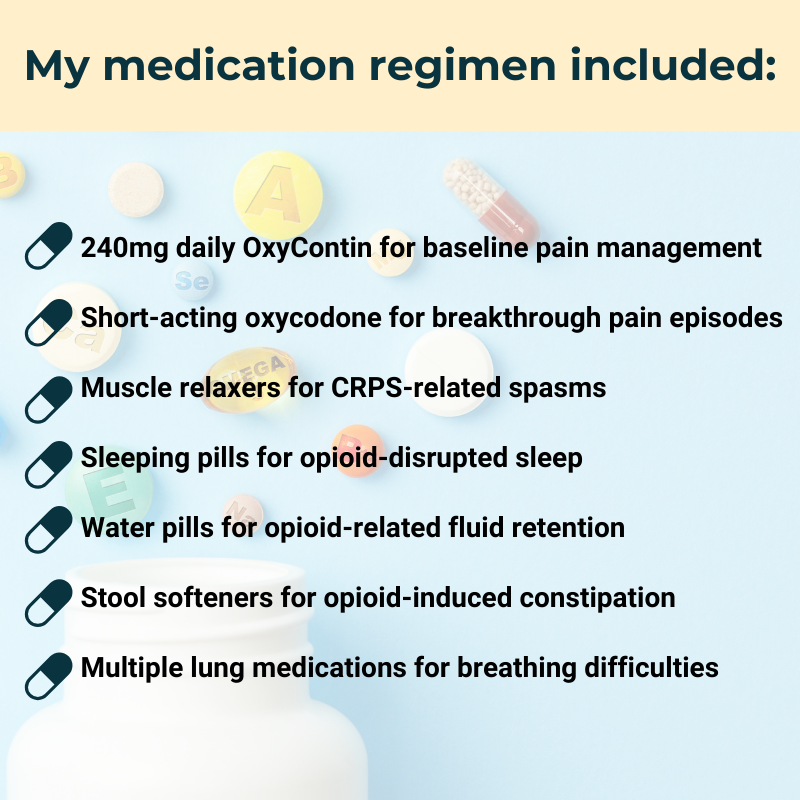
Then, in November 2015, my physician shattered my world. At my annual physical, he casually informed me that office policy changes meant he could no longer prescribe my pain medications. Two decades of responsible use—252 appointments, never late, never losing a pill, never asking for early refills, never missing an appointment. Yet he dismissed me with: "I don't know who will help you."
It felt as if my longtime trusted friend had just turned on me, punching me at my core and leaving me desperate for help.
The Harm: What Medical Abandonment Really Looks Like
Suddenly, no doctor wanted to help me. The ones who knew my medical history couldn't support me despite all the documentation of my chronic pain and severe conditions. What once made sense went black. Where I was once respected for courage and strength, even asked to mentor other pain patients, now I was treated like a criminal, a drug addict, like scum of the earth.
The "treatment" options offered were dangerous and degrading:
One pain specialist dismissed my critical health status entirely, never asking why I was on oxygen, in a wheelchair, or cared about my severe lung infection. His sole focus was getting me off opioids in one week through immediate rehab and methadone, then a spinal cord stimulator implant.
Every other doctor said, "Just get down to 80mg a day, then I can help you." Not one offered a prescription for 80mg, leaving me asking how to taper down from 240mg with no medical support.
After begging one doctor, he agreed to help only if I came to his office every two weeks so he could count my pills. Devastated, I was no longer trusted. He finally agreed to let me explore medical Cannabis but offered absolutely no guidance.
My Background: Knowing Cannabis Could Help, But Feeling Completely Alone
From my work in oncology labs in the late 1970s, I was aware that Cannabis could be an effective pain treatment. I had heard about this, but I had no direct experience with anyone using it successfully. As millions of chronic pain patients were also abandoned by doctors and cut off from pain meds during the opioid crisis (3), I continued to hear whispers that some were finding relief with Cannabis.
Despite this, I felt completely isolated when I decided to try Cannabis myself. While I knew it had potential, I had no idea if it was being applied successfully for situations with pain like mine. The medical Cannabis community was still small in 2015, with limited state programs and little public discussion. I was conducting a desperate, solitary experiment to save my life.
I chose Cannabis, becoming my own health advocate and harm reduction specialist, not knowing I was part of a much larger movement of patients forced to find their own solutions when the medical system failed them.
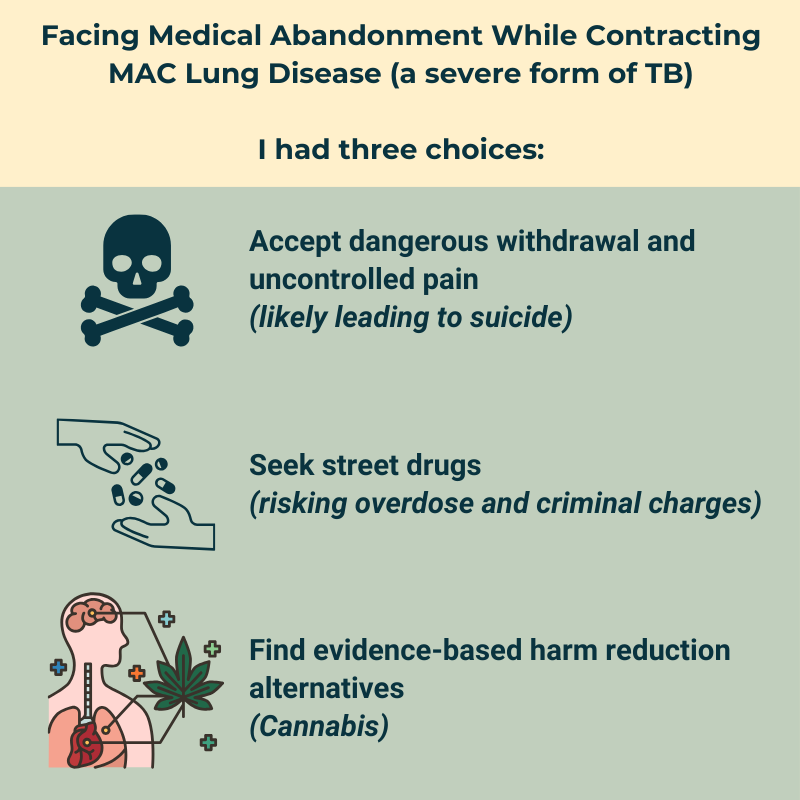
Cannabis as Life-Saving Harm Reduction
What most people don't understand is that I wasn't just dealing with pain and opioid withdrawal - I was literally fighting for my life. The CDC had given me a grim prognosis: the average life expectancy with MAC lung disease is five years, even with treatment. I also had COPD, survived MRSA pneumonia, ICU, and hospitalization for 30 days, and required around-the-clock care. My family couldn't leave me alone for even 10 minutes.
The medical system was forcing me off life-sustaining pain medication while I was dying from lung disease. The cruel irony was that I had been denied a lung transplant precisely because I was on OxyContin, the same medication they were now forcing me to stop while offering no alternatives.
Understanding Why Cannabis Worked When Nothing Else Could
My pain doctor once explained that when a coffee mug hit my foot in 1995, it was like my brain short-circuited, triggering CRPS to take over. He did not know the Endocannabinoid System (ECS) (4) at that time, any more than I did.
That led me to understand how the ECS functions as the body's internal regulatory system, responsible for keeping all body systems in harmony or homeostasis. It wasn't my brain that was broken; it was my ECS that needed support.
When that coffee mug hit my foot, my central nervous system fired electrical signals faster than my ECS could respond, leaving me in a state of chronic dysfunction. My system needed to be supplemented with cannabinoids. The eventual introduction of the right combinations of THC, CBD, and terpenes (5) quieted down my pain signals. It reduced inflammation throughout my body, allowing me to eliminate 25 prescribed pharmaceuticals with one natural plant.
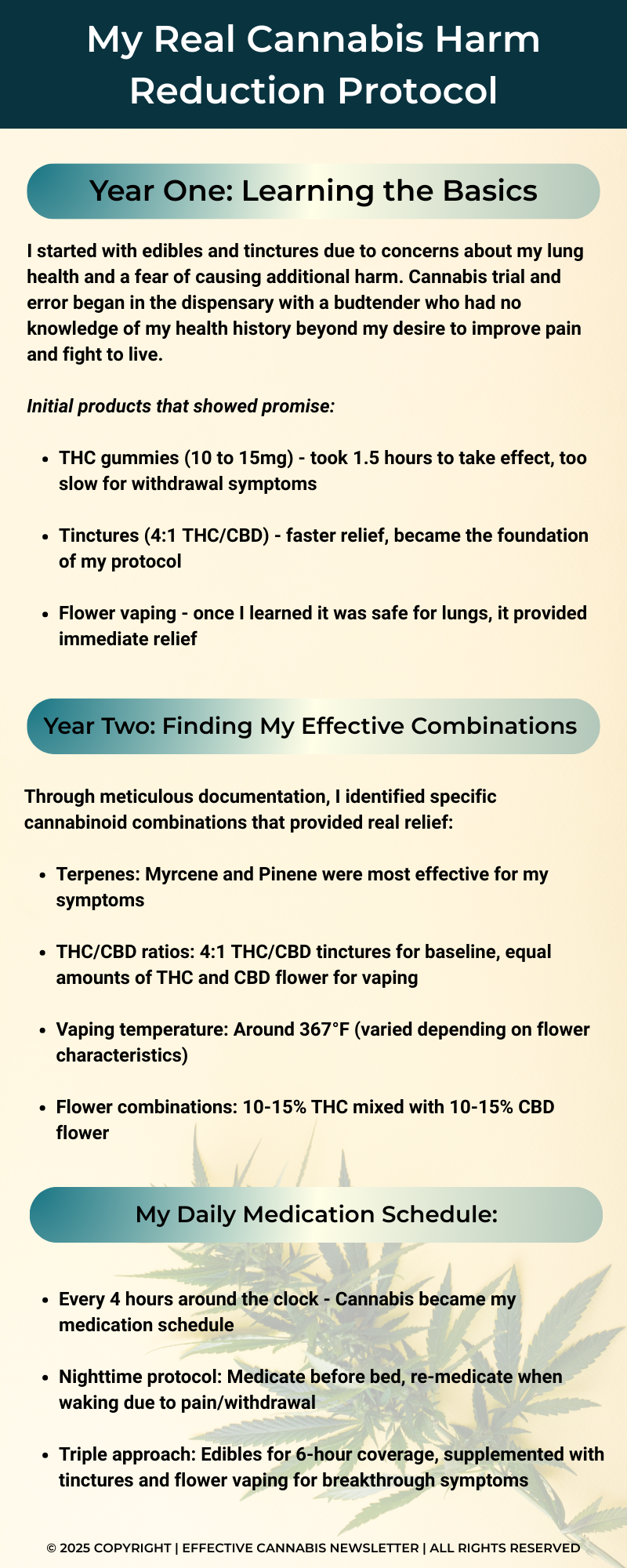
Managing 19 Opioid Tapers with Cannabis While Fighting for My Life
Each time I reduced my opioid dose, my body screamed that I was depriving it of what it needed. I had to increase my Cannabis consumption during each taper period. But this wasn't just about managing withdrawal - I was simultaneously fighting multiple life-threatening conditions.
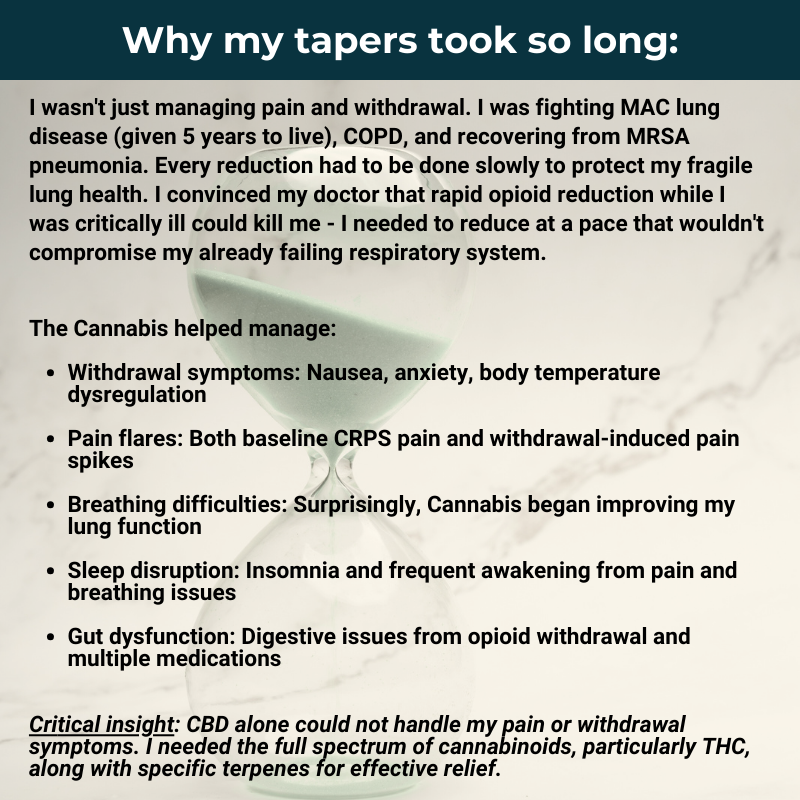
During withdrawals, I needed sedative and intoxicating Cannabis varieties to help me relax, sleep, and have breaks from the intensity of symptoms. Each taper took about 2 weeks to get through the acute withdrawal phase, then I could focus on what I needed to manage just the pain.
The final taper was the hardest, requiring months to regulate my gut health and years to normalize my body temperature. Understanding the ECS and the vital role of Cannabis was essential throughout this entire process.
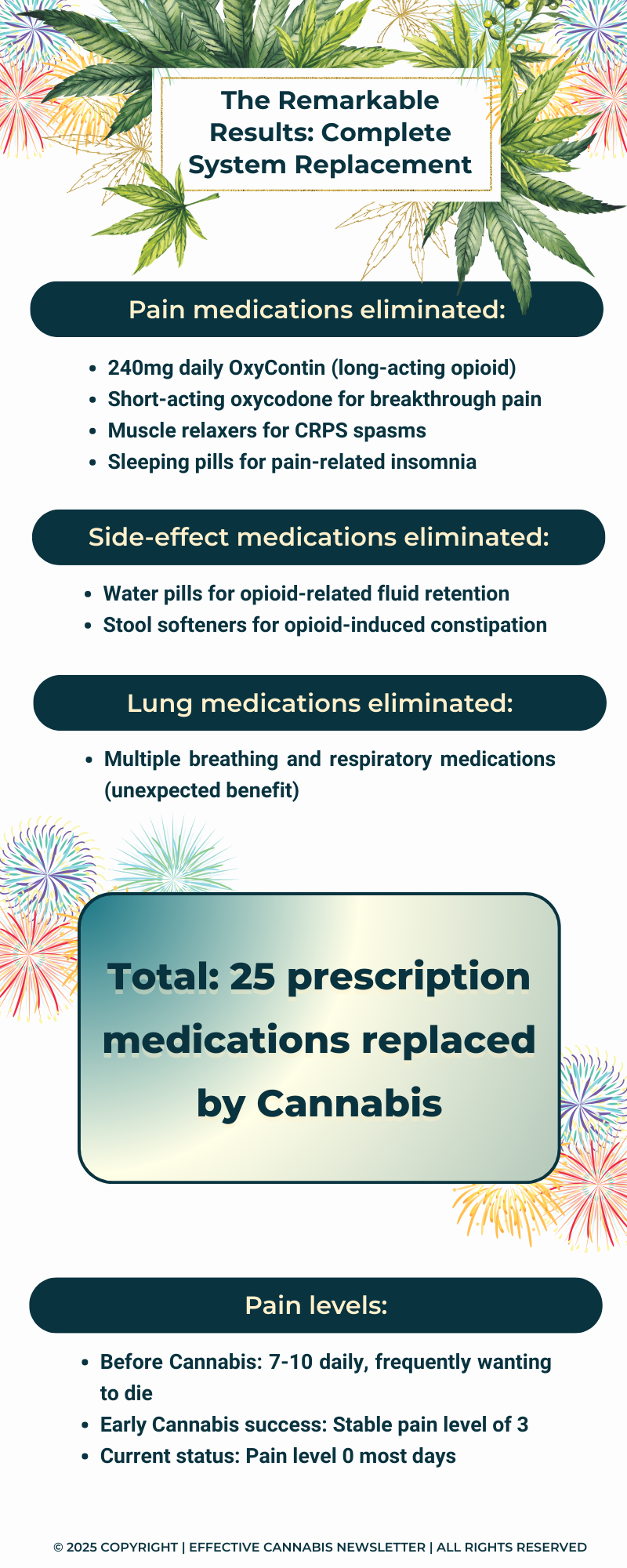
I no longer ever think of suicide or ending my life. Instead, I wake up every day excited to advocate for patients. Most remarkably, Cannabis also provided unexpected lung support. After nearly 20 years of depending on breathing treatments and medications to survive, I began forgetting to take them and realized Cannabis was giving my lungs the support they needed, replacing those pharmaceuticals.
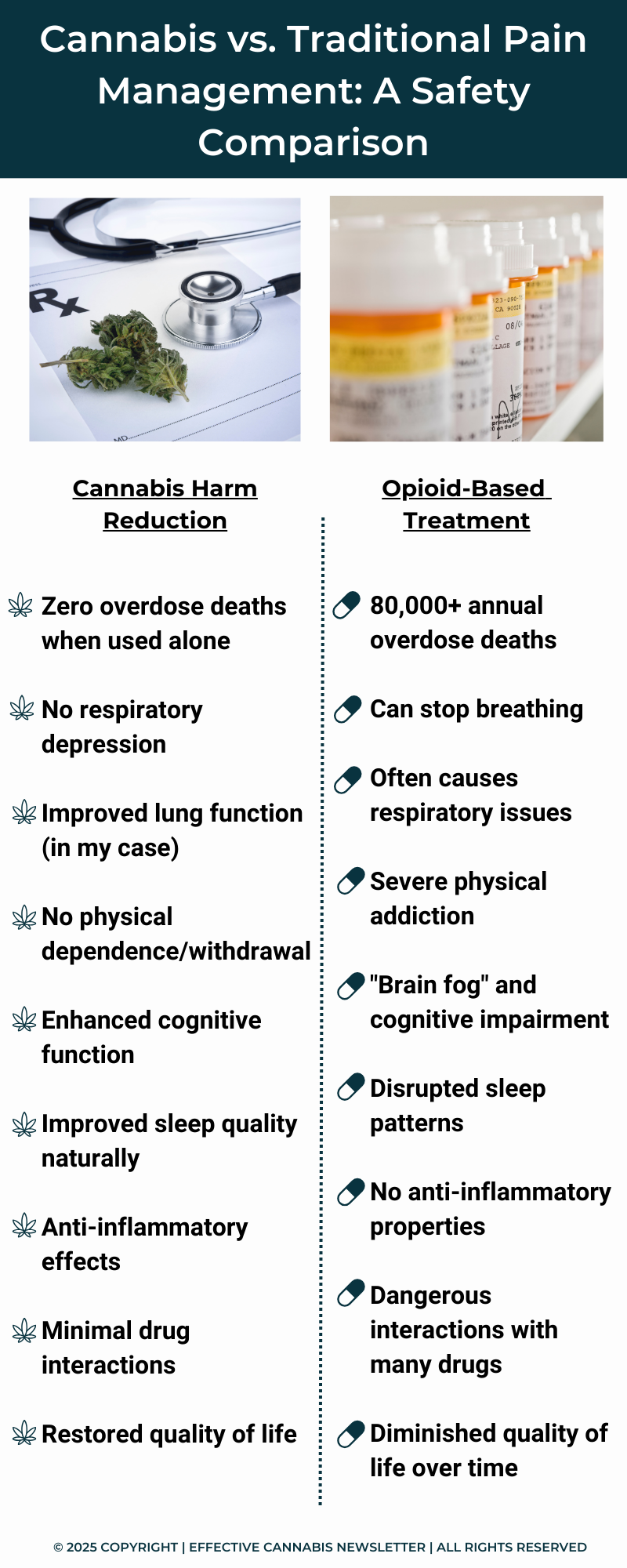
What This Means for Healthcare and Policy
My story demonstrates that Cannabis harm reduction isn't just about individual patient outcomes; it's about transforming how we approach chronic pain treatment. When the medical system abandons patients, evidence-based harm reduction tools like Cannabis can literally save lives.
For healthcare providers:
- Cannabis patients are not drug seekers—we are harm reduction practitioners
- Medical abandonment puts vulnerable patients at deadly risk
- Cannabis can replace entire pain management systems safely and effectively
- Patient experience about Cannabis effects is valuable clinical information
For policymakers:
- Cannabis access is a public health and human rights issue
- Current policies force patients into dangerous situations
- Evidence-based harm reduction saves lives and healthcare costs
- Regulatory barriers prevent access to safer alternatives
For patients facing similar situations:
- You are not drug seekers—you are human beings deserving compassionate care
- Cannabis harm reduction is a legitimate, evidence-based medical treatment
- Your expertise about your body and condition matters
- Medical abandonment is not acceptable—advocate for your right to treatment
The Critical Role of Education and Support
What I learned through ten years of study and application is that Cannabis harm reduction requires:
Understanding Your Endocannabinoid System: This internal regulatory system is responsible for managing pain, controlling inflammation, regulating sleep, and maintaining bodily homeostasis.
Proper product selection: Not all Cannabis is the same. Specific cannabinoid ratios, terpene profiles, and consumption methods make the difference between success and failure.
Systematic approach: Cannabis harm reduction requires consistent dosing schedules, careful tracking, and gradual optimization—just like any other medication protocol.
Medical supervision when possible: While I had to do this alone, patients today have more options. Work with certified Cannabis educators and coaches, and Cannabis-trained healthcare providers when available - they can help you achieve your goals faster and answer questions you may have. I became certified specifically so no one would have to go through what I went through without support and guidance.
Patience and persistence: It took me years to optimize my protocol, and each person's needs are different. What worked for me may not work exactly the same for others.
Fighting for your life: Sometimes, Cannabis harm reduction isn't just about pain management - it's literally about survival when conventional medicine has given up on you.
Resources and Support for Cannabis Harm Reduction
If you're facing medical abandonment:
- Document your medical history and current medications thoroughly
- Research your state's medical Cannabis laws and qualifying conditions
- Find Cannabis-trained healthcare providers, if possible
Connect with patient advocacy organizations for support - Consider working with certified Cannabis educators or health coaches
- Subscribe to the Effective Cannabis Newsletter for ongoing education and support
If you're a healthcare provider:
- Educate yourself about cannabinoid therapies and harm reduction principles
- Support patients with compassion rather than judgment
- Understand that Cannabis patients often know more about their condition than you do
- Focus on patient outcomes rather than drug category biases
- Subscribe to the Effective Cannabis Newsletter for professional education resources
For policymakers and advocates:
- Support comprehensive medical Cannabis programs with patient protections
- Advocate for healthcare provider education and liability protections
- Push for insurance coverage of evidence-based cannabinoid therapies
- Demand an end to medical abandonment of chronic pain patients
- Follow the Effective Cannabis Newsletter for policy updates and advocacy tools
My Mission: Ensuring No One Faces This Alone
Today, through Effective Cannabis, I work to ensure no chronic pain patient has to navigate Cannabis harm reduction without support. We provide:
- Evidence-based education about cannabinoid therapies
- Support for patients transitioning from opioids to Cannabis
- Advocacy for policy reform and patient rights
- Healthcare provider awareness of Cannabis harm reduction
- A platform for patients to share their stories and support each other
- The Effective Cannabis Newsletter with the latest research, patient stories, and practical guidance
Subscribe to the Effective Cannabis Newsletter for regular updates on Cannabis research, patient success stories, policy developments, and practical harm reduction guidance. Our newsletter connects patients, providers, and advocates in the fight for Cannabis access and education.
The evidence is clear: Cannabis saved my life when traditional medicine failed me. It can replace entire pain management systems safely and effectively when properly understood and applied. No one should have to suffer in untreated pain or risk their life seeking relief when safer alternatives exist.
Conclusion: A Life Doctors Said Was Impossible
I now live at a pain level of zero most days, something doctors said was impossible. I can laugh, relax, and be present in moments I thought I'd lost forever. I've eliminated 25 prescription medications, including powerful opioids, and replaced them with a single plant that grows naturally from the earth.
Most importantly, I've gone from contemplating suicide to waking up excited to advocate for others facing similar circumstances. Cannabis didn't just manage my pain; it gave me back my life, my health, and my purpose.
This is what evidence-based harm reduction looks like. This is why Cannabis matters. This is why patient access to all safe, effective treatments is a fundamental human right.
If you're facing medical abandonment, know that you're not alone. There are alternatives, there is hope, and there are people fighting to ensure you have access to the treatments you need. Cannabis harm reduction saved my life; it might save yours, too.
This story is shared to provide hope and information to others facing similar circumstances. Always consult with healthcare providers when making changes to your medical treatment, and ensure you understand the laws in your jurisdiction regarding medical Cannabis use.
For support and resources:
Subscribe to the Effective Cannabis Newsletter for ongoing education and community support.
Crisis support: If you're having thoughts of suicide, call 988 (Suicide & Crisis Lifeline)
References
1. “Complex Regional Pain Syndrome | National Institute of Neurological Disorders and Stroke.” National Institute of Neurological Disorders and Stroke, www.ninds.nih.gov/health-information/disorders/complex-regional-pain-syndrome. Accessed 29 Aug. 2025.
2. Dahlhamer J, Lucas J, Zelaya, C, et al. Prevalence of Chronic Pain and High-Impact Chronic Pain Among Adults — United States, 2016. MMWR Morb Mortal Wkly Rep 2018;67:1001–1006. DOI: http://dx.doi.org/10.15585/mmwr.mm6736a2.
3. Llorente, Elizabeth. “As Doctors Taper or End Opioid Prescriptions, Many Patients Driven to Despair, Suicide.” Fox News, FOX News Network, 10 Dec. 2018, www.foxnews.com/health/as-opioids-become-taboo-doctors-taper-down-or-abandon-pain-patients-driving-many-to-suicide.
4. Kirk, Riley D. “How Cannabis Works in the Body (Intro to the Endocannabinoid System).” How Cannabis Works In The Body (Intro to the Endocannabinoid System), 6 Sept. 2023, www.effectivenewsletter.com/blog/how-cannabis-works-in-the-body-introduction-to-the-endocannabinoid-system-ecs?cid=8ea55273-4173-4b5b-9ab5-b7e3e84c4dbd.
5. Alfieri A, Di Franco S, Maffei V, Sansone P, Pace MC, Passavanti MB, Fiore M. Phytochemical Modulators of Nociception: A Review of Cannabis Terpenes in Chronic Pain Syndromes. Pharmaceuticals. 2025; 18(8):1100. https://doi.org/10.3390/ph18081100.
About Debi Wimberley:
Debi Wimberley is a resilient advocate for Medical Cannabis education and self-empowered health. A survivor of decades of chronic pain and lung disease, she turned her background in medical technology, oncology, and hospital systems into tools for thriving. Certified in Medical Cannabis applications and Patient Care, Debi is a professional communicator, podcaster, TEDx speaker, and author. Founder of Effective Cannabis and Effective Cannabis Newsletter. Her mission is to centralize quality, accurate, fact-based education through collaborative work with other certified Cannabis educators, health coaches, and professionals.
Click the Learn More Button
Effective Cannabis Newsletter is a platform to educate on the vital role of the Endocannabinoid System (ECS) in one's health. The information is not intended or implied to be a substitute for professional medical advice, diagnosis, or treatment. All content, including text, graphics, images, and information, contained in or available through this newsletter is for general information purposes only. It is not medical advice; it is health awareness.
Were you moved or inspired by a piece of content?
Do you have a suggestion or question for us?
Do you have a powerful story about your health and Cannabis?
Click the button and let us know!

